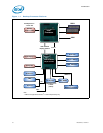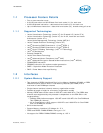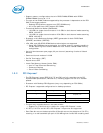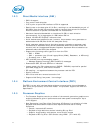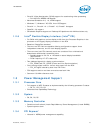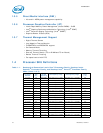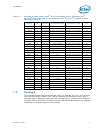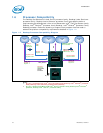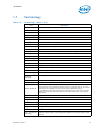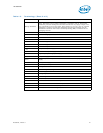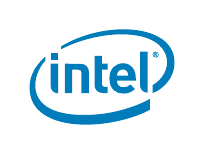
Introduction
14 Datasheet, Volume 1
1.2.3 Direct Media Interface (DMI)
• DMI 2.0 support
• Four lanes in each direction
• 5 GT/s point-to-point DMI interface to PCH is supported
• Raw bit-rate on the data pins of 5.0 Gb/s, resulting in a real bandwidth per pair of
500 MB/s given the 8b/10b encoding used to transmit data across this interface.
Does not account for packet overhead and link maintenance.
• Maximum theoretical bandwidth on interface of 2 GB/s in each direction
simultaneously, for an aggregate of 4 GB/s when DMI x4
• Shares 100-MHz PCI Express* reference clock
• 64-bit downstream address format; however, the processor never generates an
address above 64 GB (Bits 63:36 will always be zeros)
• 64-bit upstream address format, but the processor responds to upstream read
transactions to addresses above 64 GB (addresses where any of Bits 63:36 are
nonzero) with an Unsupported Request response. Upstream write transactions to
addresses above 64 GB will be dropped.
• Supports the following traffic types to or from the PCH:
—DMI -> DRAM
— DMI -> processor core (Virtual Legacy Wires (VLWs), Resetwarn, or MSIs only)
— Processor core -> DMI
• APIC and MSI interrupt messaging support:
— Message Signaled Interrupt (MSI and MSI-X) messages
• Downstream SMI, SCI and SERR error indication
• Legacy support for ISA regime protocol (PHOLD / PHOLDA) required for parallel
port DMA, floppy drive, and LPC bus masters
• DC coupling – no capacitors between the processor and the PCH
• Polarity inversion
• PCH end-to-end lane reversal across the link
• Supports Half Swing “low-power / low-voltage”
1.2.4 Platform Environment Control Interface (PECI)
The PECI is a one-wire interface that provides a communication channel between a
PECI client (the processor) and a PECI master. The processor supports the PECI 3.0
Specification.
1.2.5 Processor Graphics
• The Processor Graphics contains a refresh of the seventh generation graphics core
enabling substantial gains in performance and lower power consumption. Up to
16
EU support.
• Next Generation Intel Clear Video Technology HD Support is a collection of video
playback and enhancement features that improve the end user’s viewing
experience
— Encode / transcode HD content
— Playback of high definition content including Blu-ray Disc*
— Superior image quality with sharper, more colorful images
— Playback of Blu-ray Disc* S3D content using HDMI* (V.1.4 with 3D)







